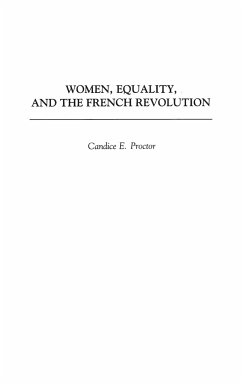The book examines the typical 18th-century concept of women as alien and in some ways inferior beings and traces the striking continuity between pre-Revolutionary and Revolutionary thought on the subject. Against this background, Proctor addresses a number of questions: How widespread was the support for a movement in favor of sexual equality? What was the response of the revolution itself to demands for equal rights for women? How did the men of the French Revolution justify the contradiction between their suppression of women and the ideologies for which they claimed to be fighting? To arrive at the answers, material produced in France in the 18th century is identified and analyzed, and cited in a bibliography of original sources. What finally emerges is a picture of the French Revolution and its attitude toward women, and an understanding of the ambivalent attitudes toward women that still affect our society today. This book may be a resource for courses in European history, the French Revolution, and women's studies, as well as a reference for college, university, and public libraries.
This volume represents the first book-length study of attitudes toward women in revolutionary France. Based on extensive research in the libraries and archives of Paris, the book examines the impact of the Revolution's ideology of liberty and equality. When the men of 1789 wrote the Declaration of the Rights of Man, they were thinking in terms of man the male, not man the species. But there were some men and women who interpreted it in terms of all humanity. The outrage of these individuals over what they perceived as a discrepancy between the principles and the practice of the Revolution motivated them to produce some of the most unhesitating declarations of sexual equality that had ever been seen in history. Dr. Proctor demonstrates, however, these claims of equality were not simply ignored; they were categorically rejected by the mainstream revolutionaries. The book examines the typical 18th-century concept of women as alien and in some ways inferior beings and traces the striking continuity between pre-Revolutionary and Revolutionary thought on the subject. Against this background, Proctor addresses a number of important questions: How widespread was the support for a movement in favor of sexual equality? What was the response of the Revolution itself to demands for equal rights for women? How did the men of the French Revolution justify the contradiction between their suppression of women and the ideologies for which they claimed to be fighting? To arrive at the answers, an abundance of material produced in France in the 18th century is identified and analyzed, and cited in an extensive bibliography of original sources. What finally emerges is not only a clearer picture of the French Revolution and its attitude toward women, but a deeper understanding of the ambivalent attitudes toward women that still affect our society today. This book will be an important resource for courses in European history, the French Revolution, and women's studies, as well as a valuable reference for college, university, and public libraries.
Hinweis: Dieser Artikel kann nur an eine deutsche Lieferadresse ausgeliefert werden.
This volume represents the first book-length study of attitudes toward women in revolutionary France. Based on extensive research in the libraries and archives of Paris, the book examines the impact of the Revolution's ideology of liberty and equality. When the men of 1789 wrote the Declaration of the Rights of Man, they were thinking in terms of man the male, not man the species. But there were some men and women who interpreted it in terms of all humanity. The outrage of these individuals over what they perceived as a discrepancy between the principles and the practice of the Revolution motivated them to produce some of the most unhesitating declarations of sexual equality that had ever been seen in history. Dr. Proctor demonstrates, however, these claims of equality were not simply ignored; they were categorically rejected by the mainstream revolutionaries. The book examines the typical 18th-century concept of women as alien and in some ways inferior beings and traces the striking continuity between pre-Revolutionary and Revolutionary thought on the subject. Against this background, Proctor addresses a number of important questions: How widespread was the support for a movement in favor of sexual equality? What was the response of the Revolution itself to demands for equal rights for women? How did the men of the French Revolution justify the contradiction between their suppression of women and the ideologies for which they claimed to be fighting? To arrive at the answers, an abundance of material produced in France in the 18th century is identified and analyzed, and cited in an extensive bibliography of original sources. What finally emerges is not only a clearer picture of the French Revolution and its attitude toward women, but a deeper understanding of the ambivalent attitudes toward women that still affect our society today. This book will be an important resource for courses in European history, the French Revolution, and women's studies, as well as a valuable reference for college, university, and public libraries.
Hinweis: Dieser Artikel kann nur an eine deutsche Lieferadresse ausgeliefert werden.








